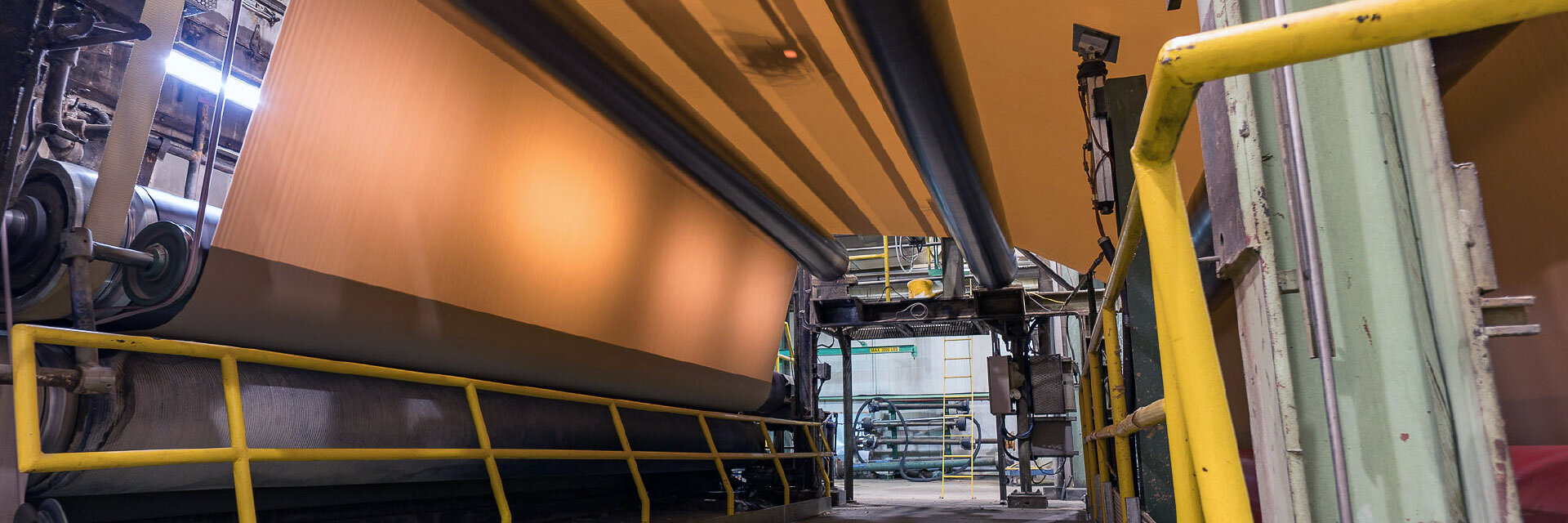
Case STudy: Canadian Kraft
Manitoba, Canada
After years of neglect, Tolko Industries announced the closure of its unprofitable pulp & paper mill in The Pas, Northern Manitoba. The mill would begin wind-down and decommissioning activities in August 2016.
This resulted in the immediate loss of 300 jobs for woodlands contractors: loggers, chippers, and truck drivers who sold their equipment and hunkered down to survive a long, lean winter. The mill’s 330 union employees prepared for their own unemployment when the mill would cease operations in December. Customers stopped ordering and moved their business to other mills. Residential real estate values in the area dropped 25% in a matter of months.
Despite a crisis in what many would believe to be a hopeless situation, American Industrial Acquisition Corporation (AIAC) saw an opportunity for revitalization and flew to Manitoba to pursue an acquisition. While the town actively welcomed AIAC, the twelve First Nation’s bands, who held sovereign claim over the forests, were skeptical of a new owner. The aging members of the union workforce would be better off financially by collecting the severance and pension guarantees rather than keeping their jobs. Through weeks of intense negotiation and constructive inclusive discussions, Leonard Levie, Chairman of AIAC, was able to bring together the following constituencies and contributions:
Three labor unions agreed to 10% wage cuts and benefits/pension freezes.
Twelve First Nations bands allowed continued access to their lands.
The Town of The Pas agreed to a 5-year property tax reprieve.
Tolko Industries agreed to sell the assets and support the new owner.
An AIAC affiliated company purchased the mill just three weeks before the scheduled shutdown and immediately worked to reverse that shutdown. The first 100 days was led by Jeff Sands, a Certified Turnaround Professional, who rebuilt constituencies and transitioned the mill to AIAC’s operating standards.
We worked with employees and they understood the future of the mill was in their hands. They accepted the challenge to become a new and better company. In 2016, the mill averaged 425 tons of prime production per day. In 2017, the mill averaged 437 tons of prime production per day but declined to only 417 tons per day as it limped into an unprecedented 42-day maintenance shutdown to catch up on many years of deferred and neglected maintenance. Coming out of shutdown, the mill sputtered and took 4 months to return to full health. In March 2018, the mill produced an average of 483 tons per day at sustainable speed. By July 2018, the mill broke its all-time weekly production record.
Prior to the acquisition
The mill lost $5 million through November 2016 leading to the shutdown. This number is understated as the mill was draining its balance sheet, deferring maintenance, employee training, and investment. Capital investment was neglected for years and had put the mill at risk of total failure.
The superheater in our recovery boiler was well past its viable life and its failure would be the demise of the mill. A planned shutdown would require 42 days to replace the superheater while an unplanned break would require over six months and cause untold damage if the mill lost power in deep winter.
At the time of the acquisition, new fencing had just been installed to secure the mill for decommissioning.
The company’s main problems
The adjacent sawmill was shut down in 2009 with the collapse of the US housing market. It was a stud mill making 2x4s for new housing construction and its chips fed the pulp mill in a mutually beneficial relationship that many pulp mills rely on. Tolko’s other businesses were all western Canadian sawmills and the entire company went into a period of retraction. The paper mill in northern Manitoba was largely forgotten and neglected.
Following the closure announcement from Tolko, the mill’s customers had signed contracts with other paper suppliers. The entire market had moved on and absorbed the loss of the mill. Stocks of fibre, hog fuel, and chemicals had been run down and employees were moving on, taking jobs elsewhere in Canada
While a pulp and paper mill is entirely dependent on fibre supply, our supply was controlled by the First Nations (indigenous people) of the area. After Tolko’s closure announcement, the 12 First Nations bands prohibited access to the fibre, effectively locking up the forests. They needed to be persuaded to lift this ban and allow harvesting operations to support the mill.
All of the company’s logging and hauling contracts, chip and hog supplier agreements had been cancelled. The company was running down its fibre supply while the woodlands contractors sold their equipment and laid off their teams. The mill’s sales were managed through a joint sales force shared with another company, which had been disassembling, effectively leaving the company with no sales force. Essential company support systems were gone or in the process of being pulled away by the time we arrived. These included phones, computers, email systems, computer management of inventory, maintenance, production, finance, and marketing.
Turnaround actions
1) First, we had to gain access to the fibre. We approached the twelve First Nation bands, who designated a working group of four chiefs to develop a joint partnership agreement with us. We approached them with an open hand and were allowed access to the forest during our negotiations.
2) Next, we rebuilt the fibre supply, which had run down to nearly empty when we purchased the mill. The logging, trucking, and chipping contractors had all sold their equipment and moved on, not expecting to hear from the paper mill again. We met with the contractors and convinced them our ability to operate the mill for long-term success, but we needed their help today. Despite all that they had been through, we needed them to mobilize crews and equipment to help rebuild our fibre supply. We also needed to restart credit terms followed by lower net prices once things stabilized. Fibre supplies remained anemic throughout the winter, dropping to as low as 8 days at one point. In Spring 2017, we were able to access new lands through our cooperation with the First Nations and were able to hire additional contractors to help with harvesting operations. Through Summer of 2017, we set new records for fibre deliveries to the mill and had proven ourselves to the many skeptical forestry contractors. We are now developing 5-year supply agreements with these contractors to help them make the investment in new inventory.
3) Next, we moved to a cash-based financial model for the business. We would manage the initial turnaround and transition of the business through the 13-week cashflow forecast model. This was an entirely new way of thinking for the mill but the finance and accounting team was quickly able to embrace this method.
4) We stabilized and gained control of production. The mill was widely known to be unreliable and riddled with equipment shortcomings but we had to run flawlessly to regain the confidence of our customers. AIAC brought in Jari Vainio, its technical paper specialist, to oversee operations and plan the unprecedented 42-day maintenance shutdown in September 2017.
5) We had to rebuild the sales channel, but the company had no sales team and limited working capital. We identified an opportunity to quickly sell products at the spot market with shipments to Egypt and China. Tolko formerly had a joint sales partnership with a complementary pulp and paper mill, but this had fallen apart when Tolko announced the mill closure. In February 2017, Tony Zandos, a senior vice president at AIAC, was brought in to manage the commercial needs of the business and rebuild the sales channel. Tony led a cultural shift towards greater inclusion, transparency, and accountability within our team and throughout our community. Through many lengthy and positive discussions with our partners, we signed new agreements that secured a sales force for the future.
6) Finally, we had to regain the higher profit North American customers. We flew out to meet with each customer and assured them our long-term commitment and capability to serve them. We were able to regain all North American sales as well as other customers. For 2018, we were sold out.
Results
The financial results have been superb. AIAC turned around an operation that was generating $130 million revenue and losing almost $10 million before taxes in 2016 to generating $170 million revenue and earning $31 million before taxes in 2018.
The turnaround saved the economy of The Pas, Manitoba and surrounding areas of the Province. The mill had a payroll of $37 million and was by far the largest contributor to the local economy. This would have resulted in the loss of some 2,800 jobs and the decimation of real estate property values and lifestyle of the town and region. Our 300 employees comprised 14% of the town’s households. The hit to tax revenue and huge social support costs for the Provincial Government and, ultimately, the Federal Government would have been immense. The social impacts of unemployment would have been widespread.
Demographically, about half of The Pas’ population is aboriginal people and they are well represented in the mill workforce. For decades, the people had been able to harvest their lands for investment in housing, jobs, medical care, and education. The mill is the largest processor of this renewable resource.
In the news:
Turnaround Management Association’s Mid-Size Company Turnaround of the Year for 2018
https://turnaround.org/news/tma-announces-winners-2018-turnaround-and-transaction-awards
Tolko Industries: Why they're closing The Pas mill and what it means
https://www.cbc.ca/news/canada/manitoba/loss-tolk-the-pas-1.3734701
'We're like country music. We're here to stay': Cautious optimism in The Pas a year after paper mill saved
https://www.cbc.ca/news/canada/manitroba/the-pas-optimism-1.4594554
Canadian Kraft Paper celebrates first anniversary
https://www.pulpandpapercanada.com/news/canadian-kraft-paper-celebrates-first-anniversary-1100000864
Canadian Kraft Paper Turns the Page
http://magazine.pulpandpapercanada.com/publication/?i=557937
Canadian Kraft Paper receives 2019 Export Award Recognized by the Canadian Manufacturers & Exporters Association


